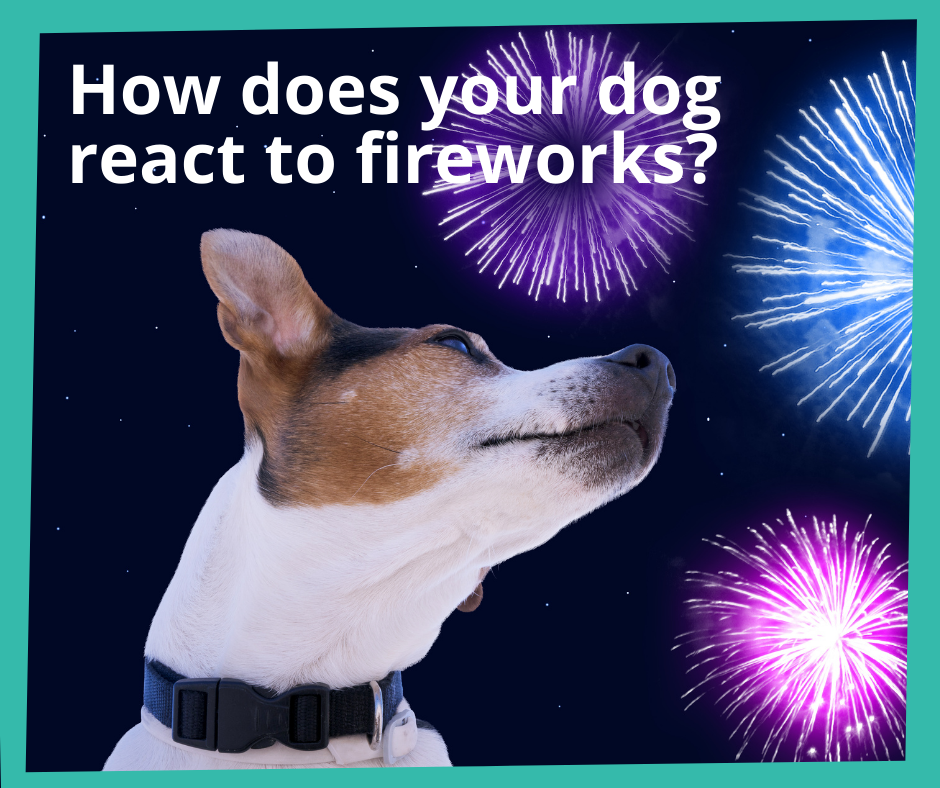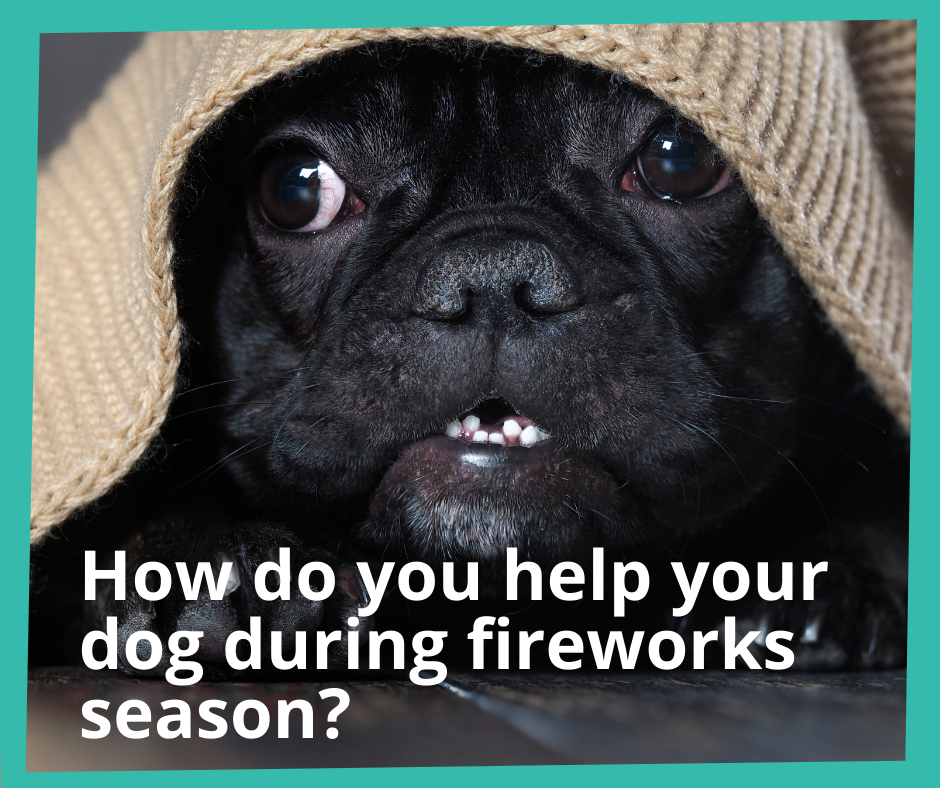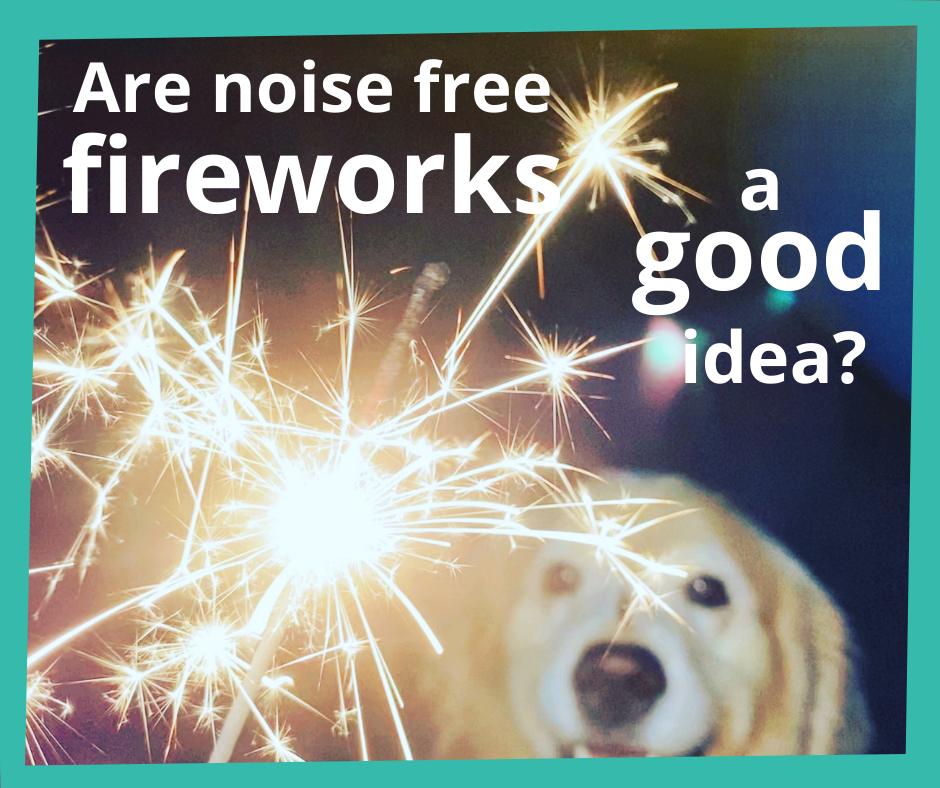The nights are drawing in, and our dogs are getting used to the new season which of course means fireworks night is just around the corner. Sadly for our pets, fireworks night is no longer just one night of the week, fireworks are frequently let off for many weeks and are abundantly available to anyone over the age of 18 who wishes to buy them.
This frequently results in fireworks being set off at all times of the day, and in some cases, they have been used to inflict injury to small furries and cause immeasurable suffering to many of our pets.
If you have a pet that is scared of fireworks it's heartbreaking to see our best friends in a state of panic and fear. My heart goes out to every pet owner supporting a pet through this season.

You may be one of the lucky ones with a dog that copes well, you may be thinking they'll never have a problem with fireworks. Well, that's unfortunately where you're wrong. We see it time and time and time again, even the most ‘bombproof’ of dogs can end up with some level of noise sensitivity. Up to 45% of the UK dog population currently suffer from firework phobia and it is increasing every year. The reason I believe it's become a bigger problem is that fireworks have become louder and brighter, and more frequent.
The amalgamation of the noise and the length of time our dogs are exposed to the fireworks is a real factor for our dogs. Just imagine being exposed to gunfire, all of a sudden in your back garden. How would that make you feel? Terrified you would probably say.
A good number of dogs can live happily through fireworks and have no problems at all. But that doesn't mean that won't change over time. So even if your dog is fine with fireworks now. Don't become complacent because it could be a problem in the future.
Now’s the time to prevent problems of the future and help our dogs with fireworks phobias cope better. In an ideal world as a behaviourist, I know it takes time to change behaviours. It takes time to change habits, and it takes time to change that fear network that a dog has in its brain. We are in October and in reality, if I was working with your dogs, I would probably have been working with them since last December to prepare them for this seasons fireworks.
Don't despair because there is still time to take action now. It may not prevent everything that you want to solve with your dog, but it will certainly go a long way to help. I'm going to take you through a step by step guide of what to do with your dog to help them through fireworks season.
When your dog gets scared, the fight or flight part of the brain activates, which tells the brain that was a bad and scary experience so that next time it happens the dog's brain is telling the body to save itself which is why we can see extreme reactions from our dogs. Reactions can range from panting, pacing, barking, shaking, whimpering, high respiration rate to name a few.
None of these signs is conducive to good health for the short and long term for our dog.
We obviously can't stop the fireworks from outside, because that's going to happen whatever we do, but we can prepare our dogs beforehand.

1. Ensure your dog has suitable beds around the house. Assess your house and observe where your dog chooses to rest. Make a note of the top three places they chose (not necessarily where their beds are) This should be the basis of your planning for fireworks season.
2. The second thing to consider is what can we do to desensitise our dogs before the noisy nights? Noise CDs and firework noise apps online can be used over time to create gentle desensitisation to those types of noises. My personal view on this, is it can help a little bit, but I do not believe that a noise CD or a sound on the internet is a true reflection of what dogs experience on fireworks night due to the loudness, the vibrations, and also the smell fireworks give off. But let's start with this because if your dog has a sensitivity to low-level noise this will certainly help in the first instance. We want to go through a process called desensitisation. Here’s an example of how desensitisation works
Have you ever worked in a room where you've heard a ticking clock? First, you may hear that tick-tock, tick-tock, tick-tock, but over time of working in that room when your attention may be on writing emails, for example, you won't hear the tick-tock, tick-tock, tick-tock, because it will become background noise that you have filtered out and desensitised to. You may however find the tick-tock, tick-tock, particularly offensive, and what will happen is you'll probably listen out for it more, and you will hear it more. That’s because your brain somewhere along the line has learnt that sound is unpleasant and has triggered a negative feeling. The same thing happens with our dogs suffering noise sensitivities.
To achieve desensitisation we can play the noises on a low level over and over and over again so it doesn't affect them and is not causing them to react. Over time we can slowly ramp up the volume levels but each time we do we must keep an eye on our dogs to keep them under the threshold and not reacting to that noise. That's something that does need to happen now. And ideally, as soon as you possibly can.
For a much more detailed training plan to help your dog through fireworks night join our online fireworks course here
3. If your dog has a history of suffering from firework phobias speak to your vets NOW. I cannot stress how important this is. Some fantastic new medications have come available over the last few years and your vets can provide extremely effective prescription products that can make a huge difference to the well being of your dog. Never allow your dog to suffer, if your dog is trembling, whining, pacing seek veterinary help, I cannot stress this enough having seen dogs that were left without help before finally seeking help from a professional.
4. If your dog has mild symptoms or you are worried they may display symptoms you can prepare by purchasing some calming supplements such as Dorwest herbs skullcap and valerian and home kits such as Adaptil pheromone diffusers, and pet remedy calming sprays.
5. Do not leave your dog when fireworks are likely. They need you there to help them cope and ensure they do not hurt or injure themselves.
6. Prepare multiple den areas based on your preparation in point 1
7. Play background music, studies have shown a mix of reggae and soft rock is the most effective to help your dog. The regularity in beat mimics their heart rate and helps calm dogs. Classical music can help initially, but the effects soon wear off according to research at Glasgow University.
8. Take your dog out early before it is dark, ensure they are adequately exercised and relaxed for the evening

9. Use Scent work games during the day such as find it. Or if you want to train your dog to find particular scents you could take part in our online scent detectives course.
10.Secure gardens, as dogs pose a much greater flight risk during fireworks season, and always accompany your dog into the garden for toilet breaks in case a stray firework happens and scares your pet.
11. Stay Calm. As annoying and distressing as it is to see our pets going through such an awful time, our stress will almost certainly be felt by our dogs.
12. Cover windows and blackout the flashes as much as possible
13. Feed earlier or in plenty of time to ensure your dog can toilet before the fireworks start and have time to digest their food. Stress and fear affects digestion and you may find your dog has diarrhoea or other symptoms
14. Feed 50g of carbohydrate an hour after their meat meal. Eg cooked pasta. This will help promote that sleepy restful feeling like we humans have after a meal.
15. Be aware that dogs that experience stress during fireworks will have the stress hormone called cortisol in their body for up to 40+ days after a stressful event. This means when they are off lead the next day you may see their training not work or they make bad choices because stress is affecting their usual thinking patterns.
For those of you already signed up for our classes and online training we will be on our community group to support you through the whole fireworks season. Free when you use any of our services online or in person.
Copyright © 2025 Best Behaviour Dog Training
Registered No. 12954178
Registered address: Poplar Hill, Stowmarket, Suffolk, IP14 2AX
Website design by Upshot Media Ltd